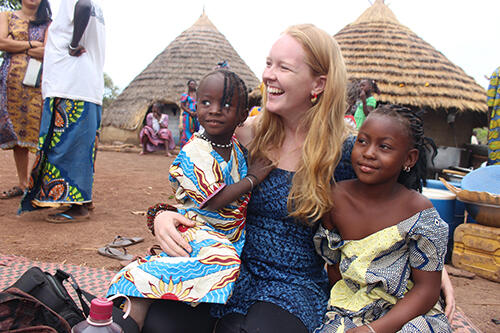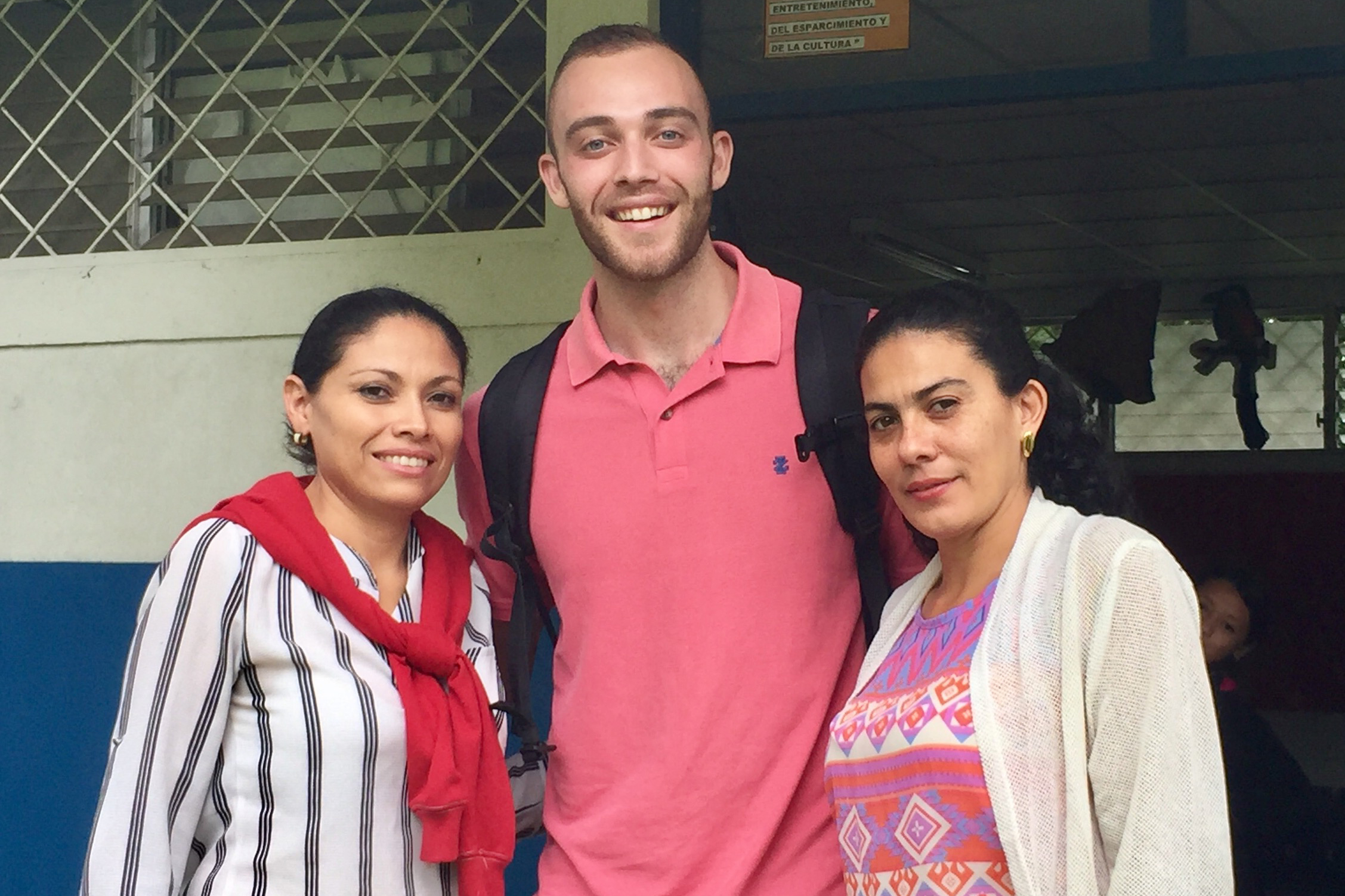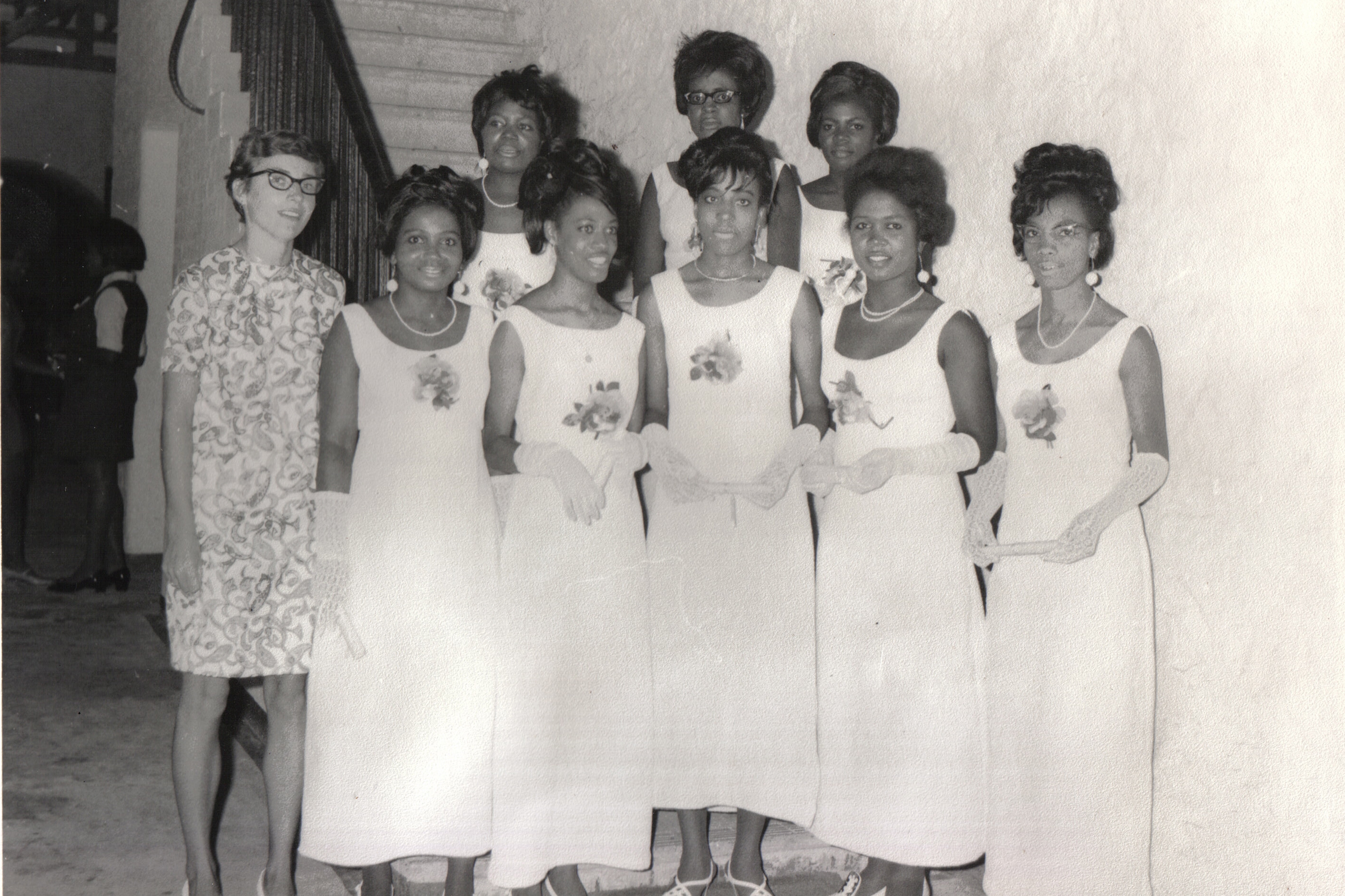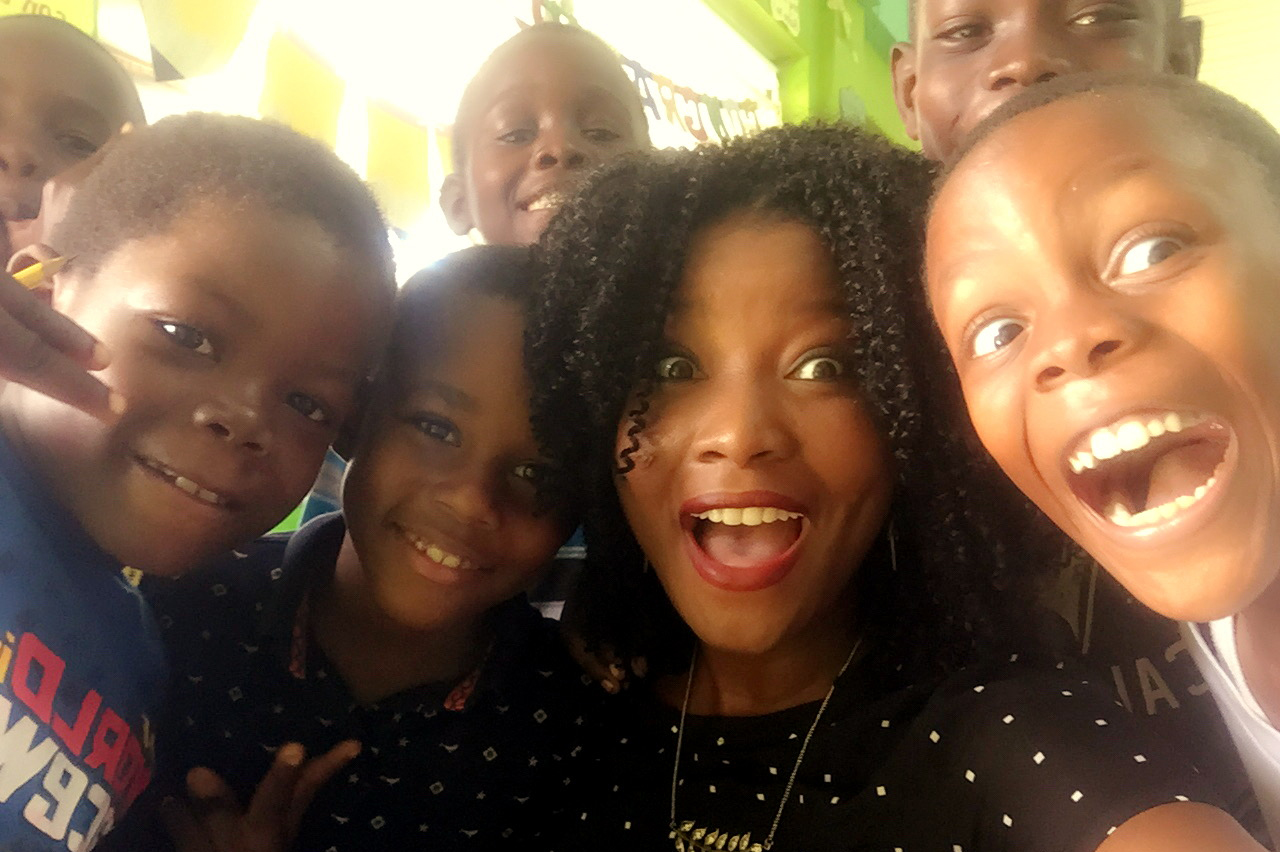
Jessica Kroenert '15 in her Senegalese village. /Photo provided by Elle DeJesus
This article was originally published in the Geneseo Scene alumni magazine. Read it and other articles in our newest issue. View our exclusive Peace Corps Scrapbook to read memories of volunteers, and submit your own Peace Corps story.
Ray Rizzo ’15 is in a small mountain town in Nicaragua sharing the foundations of entrepreneurship with teachers and high-school students who will present their ideas for new businesses in a national competition. In time, they can build their ventures and pass core skills they’ve learned to the next generation.
Ray is the latest Geneseo graduate who has volunteered for the Peace Corps since its 1961 founding by then president John F. Kennedy.
One of the earliest Geneseo volunteers was Mary Robinson Slabey ’64. She helped teachers on the Caribbean island of St. Lucia develop a nationwide mathematics curriculum in 1967.

Between Slabey and Rizzo’s tenure with the Peace Corps, 270 Geneseo alumni have lived with families to help train men and women in education, healthcare and other fields, from China and Senegal to the Comoros Islands. At least one faculty member, Jane Hogan, a retired professor of education, also served.
It is a long and consistent history of global service for Geneseo — with a unique milestone. Geneseo is ranked 14th among medium-sized schools nationwide for the number of alumni who are active Peace Corps volunteers.
The Peace Corps reports that in 2016, 18 Geneseo alumni were serving in 16 countries. This was the third year in a row that Geneseo has ranked in the top 20.
It is even more impressive when you look at the competition for such a distinction: The medium-sized category includes higher-education institutions with 5,000 to 15,000 students. Geneseo, with 5,500 students, is one of the smallest colleges in its category, but it’s clearly a powerhouse.
“It seems there is a very clear mindset at Geneseo and a willingness to take the scholarship and community service that students acquired while studying to share with the world,” says Emily Webb ’13, a public affairs specialist at Peace Corps. “That certainly says a lot about the student body as a whole.”
•••
What characteristics do alumni have or nurture to jump in to life in a new culture, with a new language and build programs from the ground up?
A primary trait is “good, old-fashioned stubbornness,” says Mia Bonarski Deschamps ’03, who taught English in Namibia. Stubbornness to stick to your will, she says, and determination is what gets you there—and beyond.
“Peace Corps is really hard. There are a lot of first-time experiences in a new culture,” Deschamps says. “You feel strange. You struggle. But, you have a desire, a goal and a mindset you are going to do this.”
Volunteers agree that fellow Peace Corps members are adventurous, resourceful, curious and open to new ideas. There is a certain eagerness that they have for new experiences and going with the flow.
“Peace Corps is an adventure every day,” says Jessica Kroenert ’15 an entrepreneurship expert in Senegal. “You can plan to do something and it may completely fall apart, but within an hour, a a new plan rises from the ashes. You have to become flexible, roll with things, and be open to new ideas to be successful.”
Sometimes alumni apply for the Peace Corps right after graduation; for others it’s years later, when they are established in their field. Several Geneseo alumni, such as Deshcamps and Slabey, signed up without any international experience.
Others, like Rizzo, discovered their capabilities via Geneseo study abroad opportunities.
As a junior, Rizzo helped farmers in rural Uganda launch an oyster mushroom farm while completing an internship program with a nonprofit organization. That farm, he says, is still successful.
“We didn’t know anything about mushrooms,” says Rizzo, “but we did know about accounting and management, and we made it work. It gave me a taste of what it’s like to live and work in a developing country. I experienced both the challenges and the rewards.”
Kroenert studied abroad three times while attending Geneseo. She studied humanities in Nicaragua, spent a semester in France, and assisted community and health projects in Haiti over a spring break.
“The personal growth that comes with those experiences,” she says, “made me want to join Peace Corps. I knew that even if it was hard, it would be worth it.”
Geneseo, they say, creates diverse opportunities for students to experience what it means to give back, and it fosters environments in which students can bolster their confidence while instilling lifelong values of community service.
That, in part, is something that generates a large pool of Peace Corps candidates, says Rob DiCarlo, associate director for internship opportunities.
“Students here have a genuine interest in global service,” he says. Service-learning programs for hurricane relief in Biloxi and Sandy Hook, and study abroad programs with a service component, such as Haiti and Uganda, “inspire students to take it to the next level.”
DiCarlo says that Geneseo continues to have a strong partnership with the Peace Corps, hosting information sessions each year, and special panels for discussion.
There’s also selflessness. Geneseo students desire to be a part of change in a collaborative way. In the Peace Corps, this often means the most comprehensive impact comes long after their two-year commitment is over.
“We are starting the seeds for something that will grow bigger when we are gone,” Kroenert says. “When your effort becomes its full beautiful self, you won’t be around. You plant the seeds for trees whose shade you will never sit under.”
•••

The seeds that have been planted by Geneseo alumni and faculty in the Peace Corps have transformed communities and the lives of the volunteers. Slabey has actually seen the fulfillment of what she started in St. Lucia. She was so committed that she returned to St. Lucia to continue curriculum development on her own time.
“The books I have helped develop 50 years ago have been revised several times and are still used, which is incredible,” says Slabey.
She knows because the teachers she made friends with in 1967 have told her. They correspond every month. “We are friends a half a century later,” she says.
Such relationships born from such partnership makes all the difference, volunteers say."It shapes your life,” says Lynn Ellingwood ’83, who worked with a community development office in Thailand to improve childcare centers.
“When I went, I was willing to accept people who were different from me,” she says, “and I was willing to feel different and not feel uncomfortable because I was different. I became a teacher of English as a second language because of my experience in Thailand.”
Ellingwood is not the only alumni who made outreach and advocacy a career. Dechamps works for the Ford Foundation in Colombia, advocating for indigenous rights and access to natural resources.
Slabey became a math professor at Mansfield University, and took leaves to volunteer for curriculum development in Barbados and Guyana. She has also dedicated herself to paying it forward.
“In St. Lucia I met many young, very bright students who were enthusiastic learners despite having limited opportunities to further their education,” she says.
As a result, Slabey has provided scholarships for nearly a dozen international students to earn their own degrees at Geneseo.
“By doing my part here, I can make a difference in students’ lives,” she says.
Their successes demonstrate a vital outcome: Volunteers’ belief that they can make a difference is replaced with knowing that that they can, and they do.

“The most important thing I’ll take away from this is the belief in my own power,” says Cladia Plantin ’12, a literacy volunteer in St. Lucia.
This year, Plantin ran a successful week-long camp to empower young women. She also spearheaded the renovation of a school library from water damage to one with cozy reading corners stocked with 1,500 books.
“I was reserved but broke out of that! I truly became a part of the community," she says. "Peace Corps has fortified my confidence that I can do anything, and make my own happiness, with less.”
—By Kris Dreessen